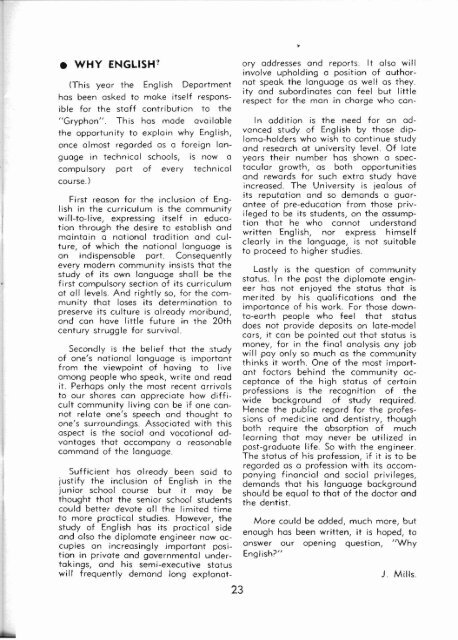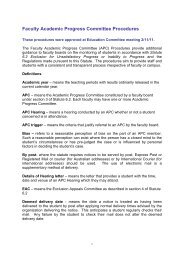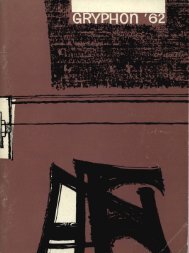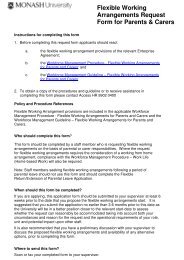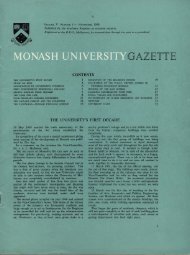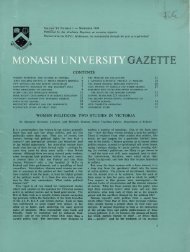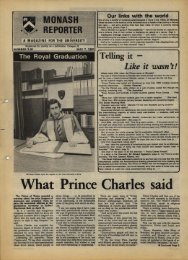Create successful ePaper yourself
Turn your PDF publications into a flip-book with our unique Google optimized e-Paper software.
• WHY ENGLISH?(This year the English Departmenthas been asked to make itself responsiblefor the staff contribution to the" <strong>Gryphon</strong>" . This has made availablethe opportunity to explain why English,once almost regarded a s a foreign languagein technical schools, is now acompulsory port of every technicalcourse. )First reason for the inclusion of Englishin the curriculum is the communitywill-to-live, expressing itself in <strong>edu</strong>cetionthrough the desire to establish andmaintain a national tradition and culture,of which the national language isan indispensable part. Consequentlyevery modern community insists that thestudy of its own language shall be thefirst compulsory section of its curriculumat all levels. And rightly so , for the communitythat loses its determination topreserve its culture is already moribund,and can have little future in the 20thcentury struggle for survival.SecondIy is the be Iief that the studyof one's national language is importantfrom the viewpoint of having to liveamong people who speak, write and readit. Perhaps only the most recent arrivalsto our shores can appreciate how difficultcommunity living can be if one cannotrelate one's speech and thought toone's surroundings. Associated with thisaspect is the social and vocational advantagesthat accompany a reasonab Iecommand of the language.Sufficient has 01 ready been said tojustify the inclusion of English in thejunior school course but it may beth<strong>au</strong>ght that the senior school studentscould better devote all the limited timeto more practical studies. However, thestudy of English has its practical sideand also the diplomate engineer now occupiesan increasingly important positionin private and governmental undertakings,and his semi-executive statuswill frequently demand long explonor..cry addresses and reports. It also willinvolve upholding a position of <strong>au</strong>thornotspeak the language as well as they.ity and subordinates can feel but littlerespect for the man in charge who can-In addition is the need for an advancedstudy of English by those diploma-holderswho wish to continue studyand research at university level. Of lateyears their number has shown a spectaculargrawth, as both opportunitiesand rewards for such extra study haveincreased. The University is jealous ofits reputation and so demands a guaranteeof pre-<strong>edu</strong>cation from those privilegedto be its students, on the assumptionthat he who cannot understandwritten English, nor express himselfclearly in the language, is not suitableto proceed to higher studies.Lastly is the question of communitystatus. In the past the diplomate engineerhas not enjoyed the status that ismerited by his qualifications and theimportance of his work. For those downto-earthpeople who feel that statusdoes not provide deposits on late-modelcars, it can be pointed out that status ismoney, for in the final analysis any jobwill pay only so much as the communitythinks it worth. One of the most importantfactors behind the community acceptanceof the high status of certain23professions is the recognition of thewide background of study required.Hence the public regard for the professionsof medicine and dentistry, thoughboth require the absorption of muchlearning that may never be utilized inpost-graduate life. So with the engineer.The status of his profession, if it is to beregarded as a profession with its accompanyingfinancial and social privileges,demands that his language backgroundshould be equal to that of the doctor andthe dentist.More could be added, much more, butenough has been written, it is hoped, toanswer our opening question, "WhyEnglish;)"J. Mills.


